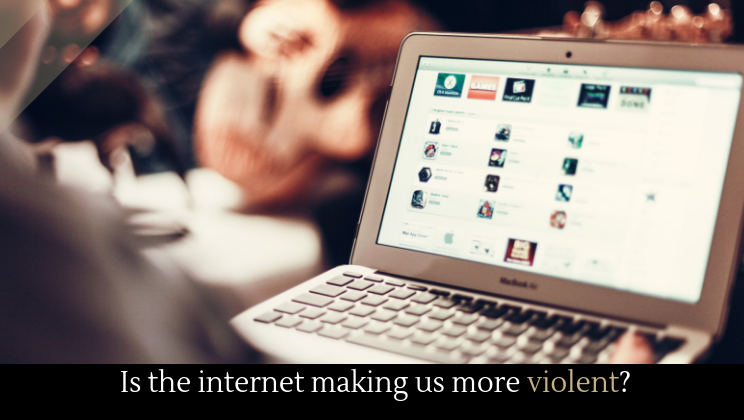Is the internet making us more violent?
Posted by Josh Taylor / November 5, 2018
In early December of 2016, a very confused young man entered a Washington D.C. pizzeria armed with an assault rifle. He was there to investigate a conspiracy about a child prostitution/political corruption ring being run through the restaurant. The #pizzagate conspiracy was originally stoked by conspiracy theorist Alex Jones, and with the help of social media the conspiracy led to violence. In the year or two after the #pizzagate conspiracy died down, critics focused their blame on on Alex Jones and the ultra-ring-wing conspiracy crowd like him. But in the past few months, more people are beginning to blame the internet itself as much as conspiracy.
The recent tragedy in Pittsburgh has brought the dangers of conspiracy, and conspiracy laden politics, back to the forefront of the national discussion. As we have argued in another post, however, this is nothing new–– conspiracies have always been a part of American politics. The Pittsburgh killer was deeply immersed in conspiracy, as this Vox article points out. But Vox misses what other news outlets have began to discuss: the roll of the internet.
In a recent interview on NPR, reporter Will Sommer describes how some alt-right websites channel conspiracies from the fringe to the mainstream. Sommer uses the example of a the migrant caravan:
“Sure. So for example, I mean, the most obvious example right now is the caravan – the so-called caravan coming out of Honduras. This is the idea that this was some big menace, you know, an invading horde is something that really sort of bubbled up on sort of the darkest edges of the right-wing Internet with a lot of sort of hoaxes behind it. And, you know, they’ve kind of been pushing this idea for a couple months now. And it’s only really this month that it’s caught on, so much so that the president is now sending troops to fight off this sort of nonexistent invasion.”
Websites like 4chan, Reddit, Facebook, and Twitter all become embroiled in this kind of conspiracy channeling. The Boston Globe has likewise pointed out that hate is spreading on the internet, and internet platforms can’t halt it. Sometimes it’s not as thought these platforms don’t want to stop it, it’s that it can be difficult, or even impossible, to delineate between political speech and hate speech across thousands of posts.
The downside is horrible, of course. The flood of hate speech on the internet normalizes it, The more we get used to the kind of hateful dialogue we see online, the easier it is to dehumanize our enemies, and the easier it is for those of us who are particularly unhinged to turn to violence. The internet, as one New York Times op-ed puts it, “will be the death of us.”
More about technology.
Interesting, but wemust take in to account the millions of other individuals, businesses etc that utilize the internet and do not commit these violent acts